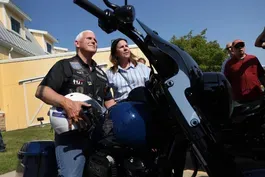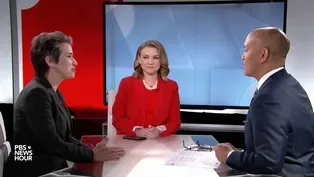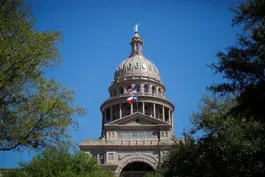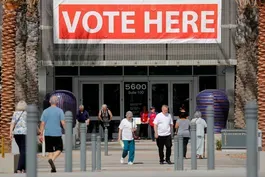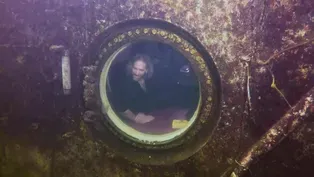
Gannett journalists walk out over pay, management issues
Clip: 6/5/2023 | 5m 32sVideo has Closed Captions
Gannett journalists across the nation walk out over pay, management issues
Staffers from two dozen newsrooms from California to New York walked off the job on Monday, striking to demand better wages and accusing Gannett leadership of mismanagement. Steven Waldman of the “Rebuild Local News Coalition” joins Geoff Bennett to discuss.
Problems with Closed Captions? Closed Captioning Feedback
Problems with Closed Captions? Closed Captioning Feedback
Major corporate funding for the PBS News Hour is provided by BDO, BNSF, Consumer Cellular, American Cruise Lines, and Raymond James. Funding for the PBS NewsHour Weekend is provided by...

Gannett journalists walk out over pay, management issues
Clip: 6/5/2023 | 5m 32sVideo has Closed Captions
Staffers from two dozen newsrooms from California to New York walked off the job on Monday, striking to demand better wages and accusing Gannett leadership of mismanagement. Steven Waldman of the “Rebuild Local News Coalition” joins Geoff Bennett to discuss.
Problems with Closed Captions? Closed Captioning Feedback
How to Watch PBS News Hour
PBS News Hour is available to stream on pbs.org and the free PBS App, available on iPhone, Apple TV, Android TV, Android smartphones, Amazon Fire TV, Amazon Fire Tablet, Roku, Samsung Smart TV, and Vizio.
Providing Support for PBS.org
Learn Moreabout PBS online sponsorshipGEOFF BENNETT: Hundreds of journalists employed by Gannett, the country's largest newspaper chain, went on strike today.
Staffers from two dozen newsrooms from California to New York walked off the job, demanding livable wages and accusing Gannett leadership of decimating its newsrooms.
We're joined now by Steven Waldman, chair of the Rebuild Local News Coalition.
That's a nonprofit that aims to advance policies to counter the collapse of local news.
He's also co-founder of Report For America.
Thanks for being with us.
And this walkout, as we mentioned, it includes workers from about two dozen newsrooms, to include The Palm Beach Post, The Arizona Republic, The Austin-American Statesman.
Help us understand the significance of this labor action today.
STEVEN WALDMAN, Founder and President, Rebuild Local News Coalition: Well, this is really just a boiling over of this terrible situation that we're having with the collapse of local news.
In general, around the country, we have seen just a very dramatic retraction of newspapers shutting down, reporters being laid off.
And Gannett has really been right in the center of that.
They have shed almost half of the newspaper staff in just two years.
And this is the reporters trying to react as best they can to what's been happening, but it's kind of a reflection of a bigger problem, which is, America's local news system is collapsing.
GEOFF BENNETT: The NewsGuild, which represents about 1,000 Gannett staffers, they sent a letter to Gannett shareholders last month urging a no-confidence vote against Mike Reed, the company's chief executive and chairman.
What are the employees demanding exactly?
STEVEN WALDMAN: Well, they want new leadership that would be more likely to invest in newsrooms.
They want a strategy and leadership that will reverse the downward trend and reverse the trend of trying to get to financial stability by eliminating reporting jobs.
There are Gannett papers now that are daily newspapers that have no reporters on them, which is a pretty astonishing thought, a daily newspaper without any reporters.
So it's really gotten that bad, where the basic information that Americans need in their communities is in many communities very hard to come by.
GEOFF BENNETT: When we talk about the collapse of local news, a report last year from Medill's Local News Initiative found that, since the year 2005, the U.S. has lost more than a quarter of its newspapers, and is on track to lose a third by the year 2025.
What's lost when we lose local news outlets?
STEVEN WALDMAN: We're losing about two newspapers a week currently in this country.
And that almost understates the problem, because, in addition to the newspapers that are going out of business, the ones that are still there, you have the ones like in Salinas, California, where you have the daily newspaper with no reporters.
So those are kind of ghost newspapers.
And it's a profound impact on American communities.
It's been shown over and over again that, when local news goes away, you have more corruption, you have higher taxes, you have more polarization.
You actually - - it's actually -- this collapse of local news is related to the rise of polarization, because what happens is, that vacuum that's created by the decline of local information gets filled by national cable TV or social media.
So it's part of that trend too.
So you end up with both of threat to democracy and its nitty-gritty way of like, you just don't have information about who to vote for, no one's holding the mayor accountable.
But it also just leads to the community frays.
People don't know each other.
People aren't learning about their neighbors.
And it contributes to this fragmentation that exists.
So it's both the health of the democracy and the health of the community are both drastically harmed by the decline of local news.
GEOFF BENNETT: A decline in advertising revenue, a decline in print circulation, that has really hit local newspapers hard.
Is there a path back to profitability at all for these local news outlets?
STEVEN WALDMAN: We're seeing a new local news system growing up that has a real shot.
So it's mostly family-owned or locally owned papers, not owned by chains, and nonprofits that have been -- 350 have been created in the last few years.
And those two groups have found a formula to get to break-even, not necessarily wild profits like they used to have, but being a strong civic institution.
And what that means is that it's not going to be done just through advertising.
It has to be a combination of advertising, reader revenue through subscriptions, and probably philanthropy to help meet the -- make the lines meet.
And, actually, I would say probably taxpayer support in some cases is going to be needed to try to help save local news in some places as well.
GEOFF BENNETT: Steven Waldman is co-founder of Report for America and chair of the Rebuild Local News Coalition.
Thanks so much for your time.
STEVEN WALDMAN: Thank you for having me.
GOP candidates flock to Iowa as 2024 race heats up
Video has Closed Captions
GOP presidential candidates flock to Iowa as 2024 race heats up (3m 3s)
How GOP candidates are taking on Trump
Video has Closed Captions
Tamara Keith and Amy Walter on how GOP candidates are taking on Trump (8m 11s)
LGBTQ+ rights spark deep divisions in small Texas town
Video has Closed Captions
Anti-LGBTQ+ activists clash with inclusive values in a small Texas town (9m 9s)
Report reveals effort to undermine election integrity tool
Video has Closed Captions
Investigation reveals effort to undermine election integrity tool (6m 13s)
Scientist lives underwater to raise ocean awareness
Video has Closed Captions
Scientist lives underwater for weeks to raise ocean awareness (5m 18s)
Providing Support for PBS.org
Learn Moreabout PBS online sponsorshipSupport for PBS provided by:
Major corporate funding for the PBS News Hour is provided by BDO, BNSF, Consumer Cellular, American Cruise Lines, and Raymond James. Funding for the PBS NewsHour Weekend is provided by...
